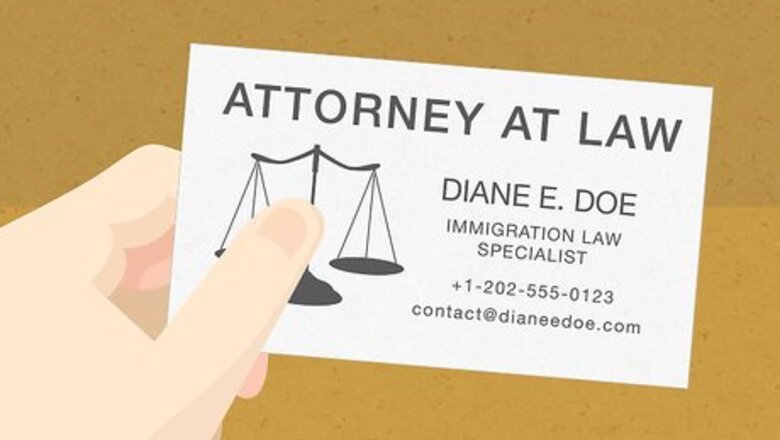
views
X
Research source
However, you may have options for gaining a green card anyway, such as seeking “advance parole” if appropriate. Because this area of law is so complicated, you need to talk with an immigration attorney.
Discussing Your Options with an Attorney
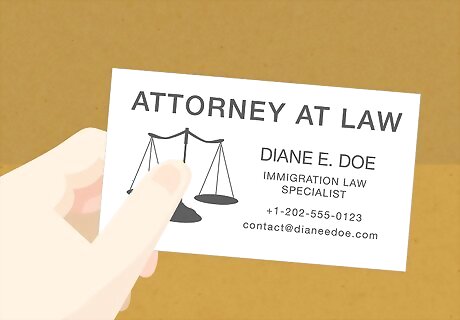
Get referrals to an immigration attorney. The best way to understand your options is to meet with a qualified immigration attorney who can review your situation and offer tailored advice. If you don’t know an immigration attorney, then you should seek referrals from the following sources: Other immigrants. Ask them if they would recommend their attorney. If they would, then get the name and contact information. Bar associations. These are organizations made up of attorneys. You can typically get a referral by contacting your local or state bar association. Visit the American Bar Association’s website for contact information. Another attorney. You might have hired an attorney to write a will or represent you in a workers’ compensation case. If so, call him or her up and ask for a referral to someone who specializes in immigration law. Legal aid. If you are low income, then you might qualify for legal aid. Legal aid provides free legal help to people in financial need, and they often provide immigration help. You can find the nearest legal aid office by visiting the Legal Services Corporation’s website. At the home page, click on “Find Legal Aid.”
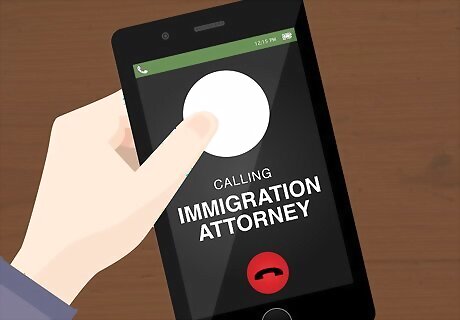
Schedule a consultation. Once you have the name of an immigration attorney, you should call the attorney and schedule a consultation. Ask how much he or she charges. Also ask about acceptable methods of payment. If you don’t speak English very well, then ask if the lawyer provides translation services or if you can bring a friend. Many immigration attorneys speak Spanish or have someone in the office who does. Ask ahead of time if they can communicate in your language.
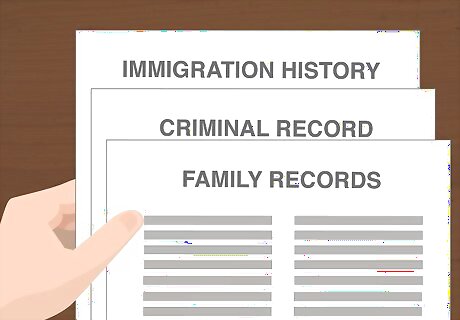
Prepare for your meeting. To fully understand your options, an attorney needs to get information about your family situation and background. You should pull together as much information as possible, including all paperwork related to your immigration history, criminal record, and family. There are many “bars” to adjusting your legal status. For example, if you let your DACA lapse at some point, then you might be prevented from adjusting your status. These are the kinds of details the immigration attorney needs to know. Similarly, if you have a deportation or removal order, then you are limited in your options. For example, you can’t qualify for “advance parole” to leave the country and re-enter unless you have the deportation order nullified.
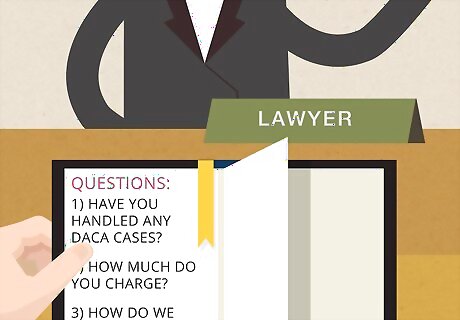
Ask the right questions. To find out whether the attorney is a good fit, you should compile a list of questions to ask at your consultation. Make sure to write them down and take them with you. For example, you should ask the following: Check whether the attorney has handled DACA cases. Immigration law is a big field, and some attorneys focus on only one area. You should ask the attorney if he or she has handled DACA cases before. If not, you should seek a different attorney. Ask how much the attorney charges. Does he or she bill by the hour? Can you get a fixed-fee agreement? If the fees are more than you can afford, you may need to look to a different attorney. Find out how the attorney communicates. You will be anxious to stay updated on the status of your case. Ask the attorney how he or she updates clients. Do they call? Send emails? Does an assistant call for them? Also ask how the attorney communicates if you have to leave the U.S.
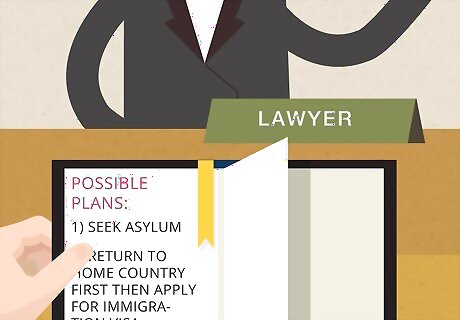
Come up with a plan. Your attorney will help you think through your best options. Since you don’t have a right to an adjustment of status as a DACA recipient, your lawyer will have to carefully go through your immigration history and determine the best path for you to take. For example, you might have to return to your home country and apply for an immigrant visa at the U.S. Consulate in your country. Alternately, you might want to seek asylum, especially if you fear political violence in your home country.
Adjusting Status through Advance Parole
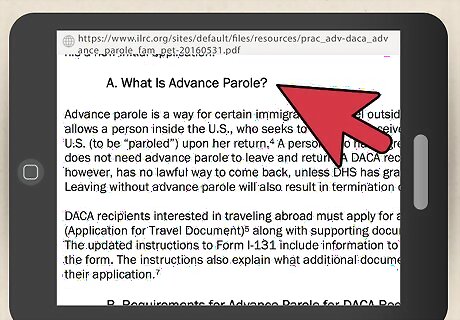
Understand “advance parole.” Under current immigration law, you can only adjust your status if you have been inspected and admitted into the U.S. Since DACA recipients entered the country illegally, they do not qualify for an adjustment of status because they have never been inspected or legally admitted. However, if you leave and re-enter on “advance parole,” then you technically have been inspected and admitted into the U.S. After re-entering the U.S. using advance parole, you might be eligible for adjustment of status if an immediate relative who is a U.S. citizen sponsors you for a green card.
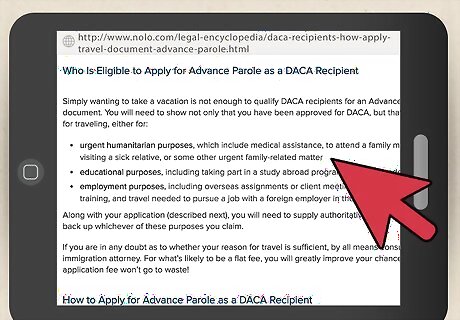
Identify reasons to seek “advance parole.” Even if you have DACA status, this status does not allow you to leave the country and legally re-enter. Instead, DACA only prevents you from being deported. If you leave on DACA status, the U.S. government can deny you re-entry. However, you can seek permission (“advance parole”) which can allow you to leave and re-enter. You can seek advance parole for the following purposes: Education. For example, you might participate in study abroad or perform academic research. Employment. You can seek advance parole for work-related purposes, such as attending trainings, interviews, or client meetings. Humanitarian. You can seek advance parole to get medical help, visit a sick family member, or attend a funeral. You may also seek advance parole to attend to another urgent family matter.
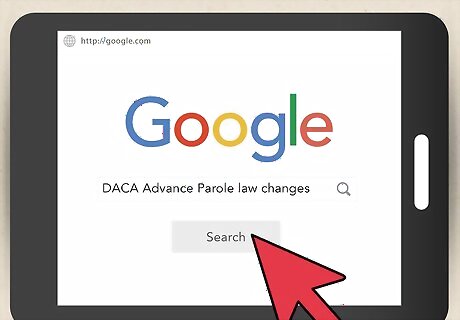
Be aware of changes to the law. As of 2016, the Department of Homeland Security (DHS) allows people who re-enter the country by advance parole to apply for an adjustment of status if they otherwise qualify. However, in the future, DHS might change its interpretation of the law. In particular, a new President who takes office in 2017 might change the law. Furthermore, getting advance parole doesn’t mean the government will automatically let you back in. Instead, it authorizes you to seek re-entry. Customs and Border Protection could still deny you entry. For example, Customs and Border Protection might find that you are unhealthy and shouldn’t be allowed back in. You should talk with your attorney about the risks involved with leaving the country and trying to re-enter. This article is not a substitute for legal advice.
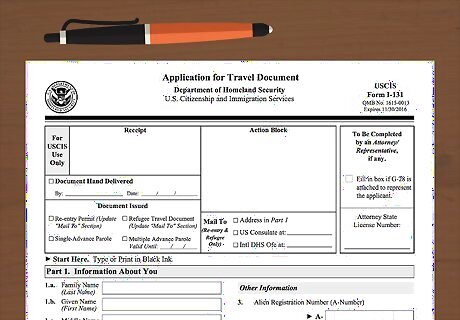
Complete the required form. You must download and complete Form I-131 to get advance parole. This form and its instructions are available at the United States Citizenship and Immigration Services (USCIS) website. Alternately, you may call 1-800-870-3676 to ask for a form. Complete the form neatly using black ink. You can also type the information into the form. Answer every question that applies to you. If a question doesn’t apply, write in “N/A” or “not applicable.” You can use additional sheets of paper, if necessary, to answer questions. Type your name at the top of the sheet. Also include your Alien Registration Number (if you have one). Be sure to identify the Part and Item Number that your answer refers to.
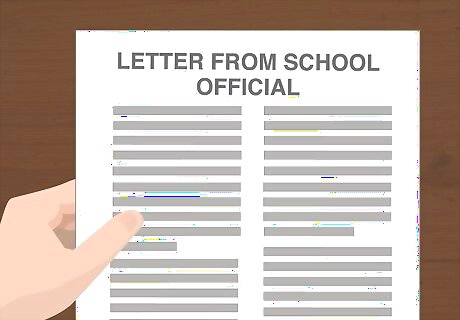
Gather supporting documents. USCIS wants proof that you have a valid reason as a DACA recipient to travel outside the U.S. Accordingly, you should look for the following documents, depending on why you are requesting advance parole: Educational reasons: You should seek a letter from a school official describing why the travel is beneficial or required. Alternately, you could get a document showing that you are enrolled in an education program that requires that you travel outside the U.S. Employment purposes: get a letter from an employer or a conference host describing why you need to travel for your job. Humanitarian purposes. You need documentary proof of a family member’s death or serious illness. A death certificate or a letter from a doctor could qualify. If you are traveling for medical treatment, then you should get a letter from your doctor explaining why you need to leave the country for medical treatment.
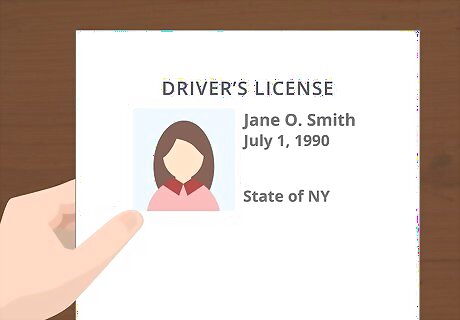
Make a copy of your photo ID. You also need to provide USCIS with a copy of your photo ID as part of your application for advance parole. For example, a copy of the identity page of your passport or a state-issued driver’s license is acceptable.
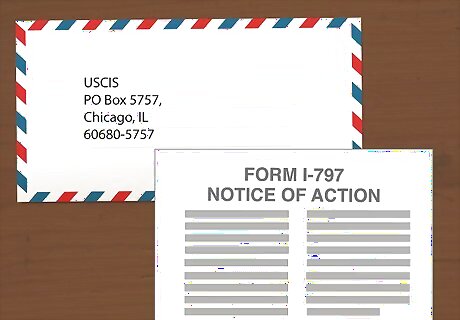
Get proof you have received DACA. You should provide USCIS with a copy of your Form I-797, Notice of Action, which shows that action has been deferred on your case. However, if Immigration and Customs Enforcement (ICE) deferred action, then you should submit a copy of the letter, notice, or approval order issued by ICE.
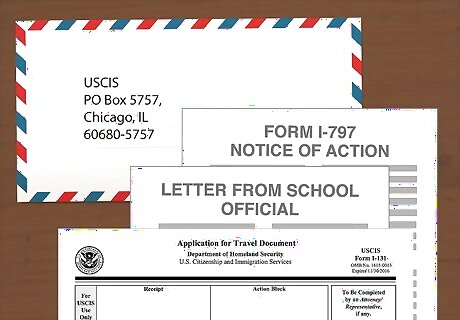
Submit your application. Gather your entire application packet: Form I-131, supporting documents, check or money order. Make a copy for your records. As a DACA recipient, you will mail your application via U.S. Postal Service to USCIS, PO Box 5757, Chicago, IL 60680-5757. If you use a courier service (like UPS or FedEx), then you should send your application to USCIS, ATTN: Deferred Action for Childhood Arrivals, 131 S. Dearborn—3rd Floor, Chicago, IL 60603-5517. Remember to include the $360 fee. Make your check or money order payable to “U.S. Department of Homeland Security.” Avoid using abbreviations such as “DHS” or “USDHS.” Because fee information is subject to change, you should call 1-800-375-5283 to get the updated amount. Also provide additional information, if requested. USCIS might contact you to provide additional information. They may also call and ask that you attend an interview at an agency office. Be sure to provide requested information as promptly as possible.
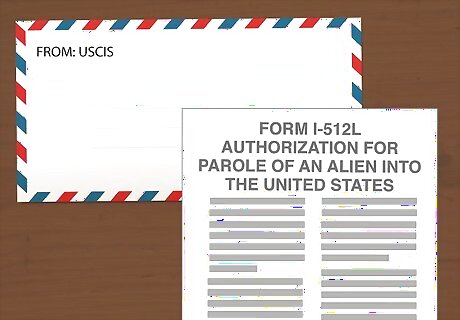
Receive your approval. After USCIS grants you advance parole, they will mail you Form I-512L, Authorization for Parole of an Alien into the United States. You will need to have this form when you travel. Remember to take the original with you.
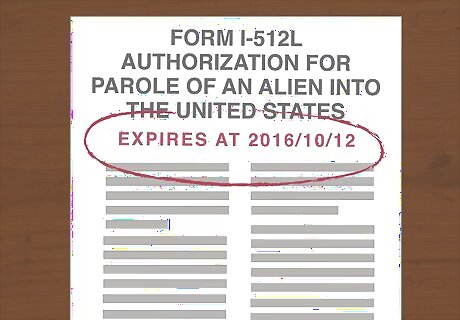
Travel outside the U.S. and return. Remember not to stay too long out of the country. Your Form I-512L should have an expiration date on it. Make sure to return to the U.S. before this date. If you overstay, you will probably be denied re-entry into the United States and you will lose your DACA status. You will need to show your Form I-512L when you get on a plane, bus, or boat to head back to the United States. You must also show it to Customs and Border Protection on your attempted re-entry to the United States.
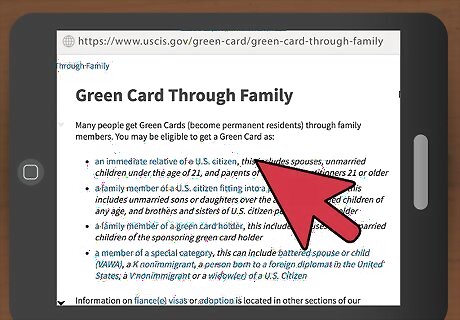
Have a family member petition you for a green card. Once you are inspected and paroled back into the U.S., you can have an immediate family member sponsor you for an adjustment of status to legal permanent resident. The family member must be an “immediate relative,” such as a spouse, parents, or children. Your family member has to start the process by filing an I-130 petition, which they can download from the USCIS website. See Obtain Green Cards for Your Family for more information.




















Comments
0 comment